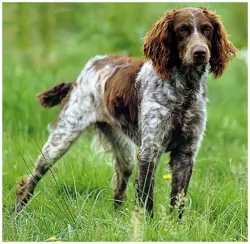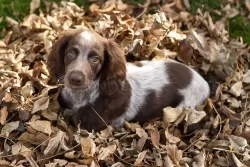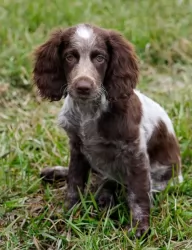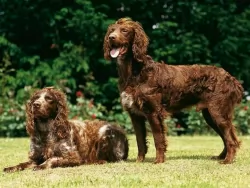 MyDogBreeds
MyDogBreeds Pont-Audemer Spaniel is originated from France but Chesapeake Bay Retriever is originated from United States. Pont-Audemer Spaniel may grow 8 cm / 3 inches shorter than Chesapeake Bay Retriever. Pont-Audemer Spaniel may weigh 18 kg / 39 pounds lesser than Chesapeake Bay Retriever. Both Pont-Audemer Spaniel and Chesapeake Bay Retriever has almost same life span. Both Pont-Audemer Spaniel and Chesapeake Bay Retriever has almost same litter size. Pont-Audemer Spaniel requires Moderate maintenance. But Chesapeake Bay Retriever requires Low maintenance
Pont-Audemer Spaniel is originated from France but Chesapeake Bay Retriever is originated from United States. Pont-Audemer Spaniel may grow 8 cm / 3 inches shorter than Chesapeake Bay Retriever. Pont-Audemer Spaniel may weigh 18 kg / 39 pounds lesser than Chesapeake Bay Retriever. Both Pont-Audemer Spaniel and Chesapeake Bay Retriever has almost same life span. Both Pont-Audemer Spaniel and Chesapeake Bay Retriever has almost same litter size. Pont-Audemer Spaniel requires Moderate maintenance. But Chesapeake Bay Retriever requires Low maintenance
 The Pont-Audemer Spaniel hails from France. The dog, known also as Epagneul Pont-Audemer is a rare breed of gun dog, and dates back to the 19th century.
The Pont-Audemer Spaniel hails from France. The dog, known also as Epagneul Pont-Audemer is a rare breed of gun dog, and dates back to the 19th century.
There aren’t clear records on the origins of the dog, but it is thought that it was developed during the 19th century. It is also thought that the dog was bred from the English Water Spaniel and the Irish Water Spaniel.
When numbers of these dogs declined, the president of the Pont-Audemer breed club permitted other breeds to be crossed with the existing gene pool. In 1980, the breed club merged with the Picardy Spaniel club and the dog is recognized by the FCI as the Pont-Audemer Spaniel.
 Fondly referred to as the Chessie, the ‘Labrador-look-alike’ Chesapeake Bay Retriever’s history extends to St. Johns Newfoundland pups which were rescued off a ship off the coast of Maryland in 1807. The Chesapeake is an American breed.
Fondly referred to as the Chessie, the ‘Labrador-look-alike’ Chesapeake Bay Retriever’s history extends to St. Johns Newfoundland pups which were rescued off a ship off the coast of Maryland in 1807. The Chesapeake is an American breed.
It is believed that the Newfoundland puppies as they grew, were bred with area dogs, with there being few records of the early dogs, but it is believed that spaniels and dogs were included.
In 1918 the Chesapeake Bay Retriever was recognized by the American Kennel Club and in 1964 the dog was declared the official dog of Maryland.
 The Pont Audemer Spaniel is a medium- to large-sized breed, standing at between 50 and 58cm in height and weighing in the region of 20 – 27kg, the Pont Audemer Spaniel has a wavy, slightly curly coat of medium length, with some long hair on the top of his head. Common coat colors include white and reddish brown although there are some solid colors too. Te Muzzle of the dog is longish and fairly pointed, the nose brown and they eyes amber or hazel. This is a deep chested dog and wile the tail is traditionally docked, these days it tends to be left long and carried with a slight curve.
The Pont Audemer Spaniel is a medium- to large-sized breed, standing at between 50 and 58cm in height and weighing in the region of 20 – 27kg, the Pont Audemer Spaniel has a wavy, slightly curly coat of medium length, with some long hair on the top of his head. Common coat colors include white and reddish brown although there are some solid colors too. Te Muzzle of the dog is longish and fairly pointed, the nose brown and they eyes amber or hazel. This is a deep chested dog and wile the tail is traditionally docked, these days it tends to be left long and carried with a slight curve.
The Pont Audemer Spaniel is an intelligent dog that will respond well to training. Training and socialization are important for making him well-rounded and obedient. This spaniel-type dog just loves having loads of fun, even to the extent of being clownish.
Because he is a working dog, and an energetic one at that, he wouldn’t do well in a tiny city property but is better suited to life in the suburbs or the countryside. He is a playful dog and will get on well with children. He can also make a great friend of other dogs, particularly if he grew up with them.
 The Chesapeake is a large dog belonging to the Sporting breed group. Perhaps one of the more distinctive features of the Chesapeake Bay Retriever is the yellowish eyes.
The Chesapeake is a large dog belonging to the Sporting breed group. Perhaps one of the more distinctive features of the Chesapeake Bay Retriever is the yellowish eyes.
This is a strong, well muscled dog that stands anywhere from 61 – 66cm and weighs between 30 – 45kg. The short, thick coat of the dog is waterproof and comes in colors ranging from brown to reddish yellow to chestnut shades.
The head of the Chesapeake is broad and roundish with medium length floppy ears. The tail is long. The toes are webbed which helps makes the dog an excellent swimmer as well.
The Chesapeake Bay Retriever is a happy kind of dog with a bright, alert, intelligent expression. He loves water and is guaranteed to make a wonderful pet for any family.
With his wonderful characteristics, it is worth training him and socializing him as this training sets parameters for him so that he becomes a wonderfully obedient dog that gets on well with other pets in the home as well as with children.
 This is truly an old breed of spaniel, loving to spend time outdoors and in marshy areas.
This is truly an old breed of spaniel, loving to spend time outdoors and in marshy areas.
He is a calm, gentle breed, and passionate breeders have worked to preserve it as the dog makes a splendid pet. With an amicable look on his face which has a kind expression, he has other good characteristics to his name such as being intelligent, courageous and energetic.
Whether you’re indoors or out, the Pont-Audemer spaniel is a great companion thanks to his loyalty. Your docile, affectionate and cheerful friend will ensure you tick him off as a pet to be recommended.
 The Chesapeake Bay Retriever is ready to be your best friend and companion. This dog breed is highly active and he’ll fit easily into a family that is active and can ensure he is involved in all their activities.
The Chesapeake Bay Retriever is ready to be your best friend and companion. This dog breed is highly active and he’ll fit easily into a family that is active and can ensure he is involved in all their activities.
The beauty about the Chesapeake Bay Retriever is that he is generally an even tempered dog, and once trained and socialized, becomes a truly splendid pet, one that will be loving and loyal with his owners.
 There isn’t a great deal of information on this dog as it is a fairly uncommon breed, but nonetheless a robust dog breed. He can reach 14 years or more if well cared for.
There isn’t a great deal of information on this dog as it is a fairly uncommon breed, but nonetheless a robust dog breed. He can reach 14 years or more if well cared for.
Their long, floppy ears may be a problem as dogs with long ears like this, where sunlight and air don’t reach the insides of the ear, are more prone to dampness, dirt and wax. The inside of the ears becomes a breeding place for bacteria.
It is the deep chest of the Pont-Audemer Spaniel that can put him at risk for developing bloat. When a dog like this becomes bloated you can actually see the swollen, hard stomach. The dog is extremely restless, he is panting and pacing. Immediate veterinary attention is required as this is a life threatening illness.
Known also as alopecia, there are a few things that can cause your pet to lose his hair. These can be hormonal issues or parasites such as worms.
 By taking good care of your Chesapeake, you can ensure his teeth remain strong, his nose is wet and his coat glossy and healthy. He is a robust breed as it is, but there are always some common dog diseases to watch out for -
By taking good care of your Chesapeake, you can ensure his teeth remain strong, his nose is wet and his coat glossy and healthy. He is a robust breed as it is, but there are always some common dog diseases to watch out for -
Obesity is an ailment that is afflicting many humans and their pets. Being overweight can bring on a host of unwanted diseases. Obesity is a serious disease that can contribute to digestive disorders, back pain, heart disease and joint problems.
Instead of showering him with little treats to show him how much you love him, rather stroke him or play a game with him – it’s the ultimate treat for him – your attention.
Remember that if you aren’t going to let your Chessie become a parent, the best thing you can do for your male or female is to have them spayed or neutered. In fact, spaying or neutering can decrease the likelihood of your pet getting certain types of cancers as well as other illnesses. Speak to your vet and discover how these procedures can be very beneficial for your pet.
 The Pont-Audemer Spaniel has always been a working breed so he is used to being active. They have high exercise requirements and will require having quite a large outdoor space to run. Ball and rope games are a must for him, lots of swimming and hikes as well as a daily walk.
The Pont-Audemer Spaniel has always been a working breed so he is used to being active. They have high exercise requirements and will require having quite a large outdoor space to run. Ball and rope games are a must for him, lots of swimming and hikes as well as a daily walk.
Even though the fairly long hair of the spaniel looks as though it may require quite a bit of upkeep, the Pont Audemer Spaniel is a low maintenance dog that will require a good brush twice a week.
While you’re brushing him, feel him over for any new, unusual lumps. Look into his eyes to make sure they’re bright and alert. Check around his ears for ticks and fleas and look inside his ears for dirt and wax which could lead to bacteria and an ear infection.
You don’t want your dog gaining weight and becoming obese as this opens up a whole lot of health issues. There are always dogs that can gain weight after they have been spayed or neutered. Remember if you’re using commercially manufactured dog food, to make sure it is high quality and also suited to your dog’s age, it’s season of life and its activity levels.
Give your canine friend some home-made food too, bearing in mind that dogs like simple, healthy food that won’t upset their stomachs, and which will be good for them too.
Boiled chicken, brown rice or pasta, sweet potatoes, carrots and spinach all chopped up can be so beneficial for your pet. If you cook it in bulk, it can be put into portions and some of this can be added into the dry kibble occasionally. This is a great treat for your dog.
Some raw meat added in from time to time can also be hugely benefit for your pet. Avoid all spicy, exotic foods for your pet.
Make sure he always has a bowl of fresh, cool water available to him.
 The Chesapeake Bay Retriever sheds fairly heavily throughout the year. The coat should be brushed at least twice a week to remove dead hair. Brushing is good for the dog too as it distributes the oils of the skin, making his coat shinier.
The Chesapeake Bay Retriever sheds fairly heavily throughout the year. The coat should be brushed at least twice a week to remove dead hair. Brushing is good for the dog too as it distributes the oils of the skin, making his coat shinier.
Because the Chesapeake has floppy ears, the ears will need to be checked on a weekly basis for signs of infection. This is of particular importance if your Chessie loves to spend time splashing around in water. The veterinarian can recommend and also advise on cleaners for your dog’s ears.
An excellent diet and plenty of exercise will ensure your Chessie can live to be 11, 12 or 13 years of age. You want to keep his diet of kibble, rice, vegetables and meat consistent so as not to upset his stomach.
Avoid giving him foods such as chocolates. Do research on the harm you can do to your pet when you feed him some human foods that are entirely not meant for a dog’s digestive system.
The Chesapeake Bay Retriever has always loved to be active - hunting for- and retrieving birds from rivers and lakes. He is used to being active and will require a good supply of exercise. Take him for long walks and let him join you on your runs or your cycling.